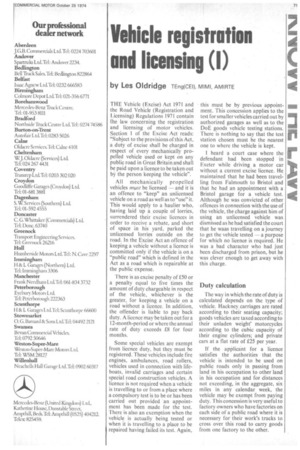Vehicle registration and licensing 0)
Page 73

If you've noticed an error in this article please click here to report it so we can fix it.
by Les Oldridge TEng(CEI), MIMI, AMIRTE THE Vehicle (Excise) Act 1971 and the Road Vehicle (Registration and Licensing) Regulations 1971 contain file law concerning the registration and licensing of motor vehicles. Section 1 of the Excise Act reads: "Subject to the provisions of this Act, a duty of excise shall be charged in respect of every mechanically propelled vehicle used or kept on any public road in Great Britain and shall be paid upon a licence to be taken out by the person keeping the vehicle".
All mechanically propelled vehicles must be licensed — and it is an offence to "keep" an unlicensed vehicle on a road as well as to "use" it. This would apply to a haulier who, having laid up a couple of lorries, surrendered their excise licences in order to receive a rebate, and short of space in his yard, parked the unlicensed lorries outside on the road. In the Excise Act an offence of keeping a vehicle without a licence is committed only if the vehicle is on a "public road" which is defined in the Act as a road which is repairable at the public expense.
There is as excise penalty of £50 or a penalty equal to five times the amount of duty chargeable in respect of the vehicle, whichever is the greater, for keeping a vehicle on a road without a licence. In addition, the offender is liable to pay back duty. A licence may be taken out for a 12-month-period or where the annual rate of duty exceeds £8 for four months.
Some special vehicles are exempt from licence duty, but they must be registered. These vehicles include fire engines, ambulances, road rollers, vehicles used in connection with lifeboats, invalid carriages and certain special road construction vehicles. A licence is not required when a vehicle is travelling to or from a place where a compulsory test is to be or has been carried out provided • an appointment has been made for the test. There is also an exemption when the vehicle is actually being tested or when it is travelling to a place to be repaired having failed its test. Again, this must be by previous appoint ment. This concession applies to the test for smaller vehicles carried out by authorized garages as well as to the DoE goods vehicle testing stations There is nothing to say that the test station chosen must be the nearest one to where the vehicle is kept.
I heard a court case where the defendant had been stopped in Exeter while driving a motor car without a current excise licence. He maintained that he had been travelling from Falmouth to Bristol and that he had an appointment with a Bristol garage for a vehicle test. Although he was convicted of other offences in connection with the use of the vehicle, the charge against him of using an unlicensed vehicle was dismissed as he had satisfied the court that he waas travelling on a journey to get the vehicle tested a purpose for which no licence is required. He was a bad character who had just been discharged from prison, but he was clever enough to get away with this charge.
Duty calculation
The way in which the rate of duty is calculated depends on the type of vehicle. Hackney carriages are rated according to their seating capacity; goods vehicles are taxed according to their unladen weight' motorcycles according to the cubic capacity of their engine cylinders; and private cars at a flat rate of £25 per year.
If the applicant for a licence satisfies the authorities that the vehicle is intended to be used on public roads only in passing from land in his occupation to other land in his occupation and for distances not exceeding, in the aggregate, six miles in any calendar week, the vehicle may be exempt from paying duty. This concession is very useful to factory owners who have factories on each side of a public road where it is necessary for their work's trucks to cross over this road to carry goods from one factory to the other.












































































































































